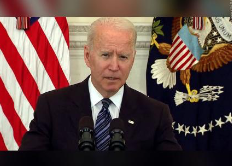Biden’s recent gun ownership executive order

Biden delivers remarks on the administration’s strategy to prevent gun crime
April 5, 2023
In early March, President Joe Biden issued an executive order which aimed to increase the number of background checks to buy guns and promote secure firearms storage.
Biden elaborated on the goal of the executive order.
“My executive order directs my attorney general to take every lawful action possible to move us as close as we can to universal background checks without new legislation,” Biden said.
The order directs federal agencies to improve public awareness and promote the use of “red-flag” laws, and instructs the attorney general to release more information about federally licensed firearms dealers who violate the law.
Red-flag laws are gun-violence-prevention acts that permits state courts to remove firearms from individuals who may be dangerous to themselves or others but have not committed a crime and do not show signs of need for mental health hold.
The executive order mandates that the president’s cabinet works on a plan to better structure the government to support communities suffering from gun violence.
The plan also calls on Attorney General Merrick Garland to shore up the rules for federally licensed gun dealers so that they know they are required to do background checks as part of the license.
Matheson Sanchez, an assistant professor of criminal justice at GC, discussed how the executive order will impact Americans.
“I think that what this executive order does is that it actually expands the circumstances around which those laws can actually be enacted and have the confiscation of firearms executed more freely, and that won’t bode well with conservative voters, and it won’t bode well with Republican and conservative legislators either,” Sanchez said.
The concepts of gun control have led to controversies across the political spectrum, and this new order is no different.
“Gun control is something that representatives of conservative constituencies are not going to want to get on board with, because that’s political suicide for them,” Sanchez said. “On the other hand, you know, I think that the majority of the more sort of liberal or progressive representatives and voters, those folks, the majority are probably going to be behind it.”
Despite the polarizing sides, recent polls show that many Americans are in favor of stricter policies.
According to a February Gallup poll, 63% of Americans are not satisfied with the country’s gun laws.
Sanchez explained why an executive order may be easier than legislation, in terms of gun ownership.
“It’s a multi-billion-dollar industry, and we have too much money wrapped up in the manufacturing sale of firearms in this country for it to be something that Congress is liable to get on board with, despite the fact the majority of their constituents might want it,” Sanchez said.
Rebecca Jones, a junior mathematics major, spoke about gun control and the causes for its interest.
“I think it needs to be stricter,” Jones said. “Obviously, with school shootings, that’s something that we could definitely improve on as a country. It’s really not even a debate.”
The executive order questions the future of gun ownership in the nation.
“It’s hard to say what future legislation will look like,” Sanchez said. “I can only say that it seems like the issues that we’re trying to address here — with mass shootings, specifically school shootings — aren’t getting any better, and I think that, in terms of gun laws, America tends to be a little antiquated, and we tend to hold on to tradition.”






